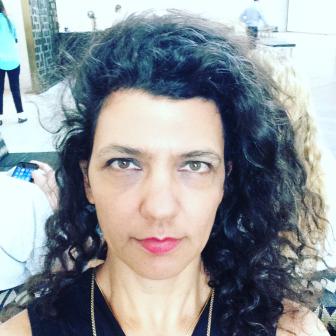Dichter
Shira Stav

Shira Stav
(Israël, 1971)
© the author
Biografie
Some of Shira Stav's poems "address female experiences and domestic life, but do so with the brutality of non-Disneyfied fairy tales", writes translator-scholar Adriana X Jacobs. "These poems take the reader to that place where tenderness and brutality meet, as in the shipwrecked house of 'Sea'. Here, we experience the precarity of family and home, the violent, quiet undoing of our own bodies. Reading these poems is like watching a time-lapse film of decaying fruit and pausing a second before their forms fall apart, at that point where 'the house/ isn’t burning yet' ('Biotope')".Stav's imagery reflects these deep feelings of disconnection. In 'Secret', our very physicality is accused of dishonesty:
this body
this mute body
this aching body
this hungry body
this steamy body
this lying
body [Tr. Maayan Eitan & Ido Admon]
Puberty arrives late in 'Authority', creating a perhaps surprisingly "seeded child" or "seeded girl". Both these readings (gendered or not) are possible, and yet another layer of estrangement is present in the original poem, as we might expect ova to be mentioned in this context:
I swear to God I no longer believed it would come,
and how I became like any other,
a seeded child. And I arrest
my breath and labor to exert authority [Tr. Itamar Francez]
The poet, author of two books of verse, is a senior lecturer in the department of Hebrew literature at Ben-Gurion University of the Negev, where her research areas include comparative and Hebrew literature, feminist studies and psychoanalysis. She is the author of [in Hebrew] Reconstructing Daddy: Fathers and Daughters in Modern Hebrew Poetry (2014); The Return of the Missing Father: A New Reading of a Chain of Stories from the Babylonian Talmud (2018, together with Haim Weiss); and many journal articles. Stav is also the editor of All the Lights Went out at Once: The Prose of Tirza Atar (2010) and of Pain in Flesh and Blood: Essays on Malady, Suffering and the Indulgence of the Body (2013, together with Oreet Meital).
In 2007 Stav was awarded the Teva Prize for poetry, and in 2013, the Bernstein Prize. Her work has been translated into English, German and Arabic. She has translated into Hebrew a collection by American poet Sharon Olds (The Floor of Our Life, 2017). She has also published Hebrew translations of the work of Margaret Atwood, Louise Glück, Carolyn Forché, Ocean Vuong and others. Stav has served as a regular contributor of book reviews to the literary supplement of the Israeli newspaper Haaretz (2005-2016), and won the 2009 Bernstein Prize for literary criticism.
In her role as an academic, Stav has been a research fellow at Katz Center for Advanced Judaic Studies in Philadelphia, the Taube Center at Stanford University and the Jewish Studies program at University of California, Santa Cruz.
© Lisa Katz
Poetry in HebrewLashon Itit/lSlow Tongue,Tel Aviv, Dvir, 2012
Shrir Halev/Heart Muscle, Tel Aviv, Hakibbutz Hameuchad, 2019
Gedichten
Gedichten van Shira Stav
Sponsors
























